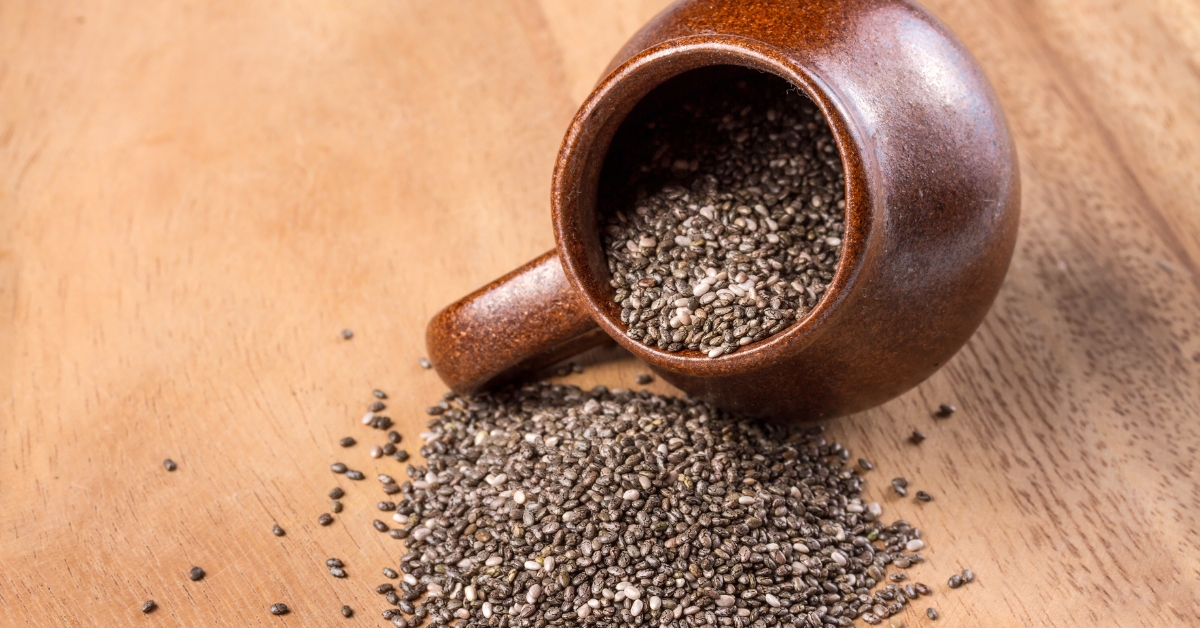Welcome to Functional Wellness Network, your reliable source of information on holistic health and functional medicine. Today, we want to talk to you about a food that has gained a lot of attention in recent years for its numerous health benefits: chia seeds. These small yet powerful seeds are not only a nutritious addition to the diet but can also play a significant role in functional medicine, offering anticancer properties and other health benefits.
Chia seeds are acclaimed for their richness in essential nutrients for the body:
- Omega-3 Fatty Acids: Essential fats for cardiovascular, brain, and eye health. They are an exceptional plant source of alpha-linolenic acid (ALA), a type of omega-3 crucial for brain development and function, cardiovascular health, and inflammation reduction.
- Fiber: They provide a high content of dietary fiber, both soluble and insoluble, making them allies for healthy digestion, blood sugar regulation, and promoting satiety.
- Proteins: They contain all essential amino acids, making them a complete source of protein ideal for vegetarian and vegan diets.
- Minerals: They are a rich source of calcium, magnesium, iron, and zinc, essential minerals for bone health, muscle function, energy production, and strengthening the immune system.
- Antioxidants: They have a high content of antioxidants, such as polyphenols, which combat oxidative stress, protect cells from damage, and reduce the risk of chronic diseases.

Beyond Nutrients: Chia in Functional Medicine
Functional medicine focuses on identifying and addressing the root causes of health problems, promoting the overall well-being of the individual. In this holistic approach, chia seeds are positioned as a valuable ally due to their multiple health benefits:
- Digestive Health: The high concentration of fiber in chia seeds not only promotes healthy digestion but can also help prevent gastrointestinal diseases. Soluble fiber forms a gel when mixed with water, which can help regulate intestinal transit, prevent constipation, and promote the growth of beneficial bacteria for digestive health.
- Blood Sugar Control: Chia seeds can be a valuable ally in stabilizing blood sugar levels, which is crucial for the prevention and management of type 2 diabetes. Soluble fiber slows down the absorption of carbohydrates, helping to prevent spikes in blood sugar after meals and improve insulin sensitivity.
- Cardiovascular Health: ALA and other omega-3 fatty acids present in chia seeds are known for their cardiovascular health benefits. These include reducing inflammation, improving lipid profile (decreasing “bad” LDL cholesterol and increasing “good” HDL cholesterol), lowering blood pressure, and reducing the risk of heart disease.
- Anticancer Potential: The antioxidants and omega-3 fatty acids in chia seeds have also been studied for their potential anticancer properties. Antioxidants help neutralize free radicals, unstable molecules that can damage DNA and lead to cancer development. Additionally, some studies have suggested that ALA may inhibit the growth of cancer cells and reduce inflammation, a key factor in cancer development.
Scientific Evidence Supporting the Anticancer Properties of Chia
While research in this field is still ongoing, several studies have provided promising evidence on the role of chia in cancer prevention:
- In Vitro and In Vivo Studies: Preliminary research has shown that compounds present in chia seeds can inhibit the growth of cancer cells in cell cultures and animal models. For example, a study published in the Journal of Molecular Biochemistry found that ALA from chia seeds had inhibitory effects on breast and cervical cancer cells in laboratory studies.
- Anti-inflammatory Properties: Chronic inflammation is a known risk factor for the development of various types of cancer. Omega-3 fatty acids in chia seeds have anti-inflammatory properties, which may help reduce the risk of cancer associated with chronic inflammation.

Precautions:
- If you are taking anticoagulants, consult your doctor before significantly increasing your consumption of chia seeds, as they may affect the action of the medication.
- Individuals with allergies to sesame seeds or plants in the Lamiaceae family should exercise caution when consuming chia seeds, as they may experience cross-reactive allergic reactions.
- It is important to start with small amounts of chia seeds and gradually increase intake to avoid digestive discomfort such as gas or diarrhea.
5 Functional Recommendations for Incorporating Chia into Your Diet
- Increase Satiety and Appetite Regulation: Incorporate hydrated or ground chia seeds into your yogurt, oatmeal, smoothie, or fresh fruit to start your day with a fiber-rich breakfast and control appetite during the morning.
- Improve Digestion and Regulate Intestinal Transit: Consume 1-2 tablespoons of hydrated chia seeds in water or plant-based milk overnight or before meals to promote healthy digestion and regulate intestinal transit.
- Control Blood Sugar: Substitute part of the flour with ground chia seeds in the preparation of bread, tortillas, or cookies to increase fiber content and help regulate blood sugar levels.
- Strengthen Cardiovascular Health: Add ground chia seeds to salad dressings, vegetable sauces, or dips to increase fiber and omega-3 content, beneficial for cardiovascular health.
- Boost Immune System Health: Incorporate hydrated or ground chia seeds into your yogurt or fresh fruit to increase fiber, antioxidants, and omega-3 content, which strengthen the immune system.
In conclusion, chia emerges as a food with multiple health benefits, offering exceptional nutritional properties that can significantly contribute to overall well-being and chronic disease management. Preliminary evidence regarding its anticancer effects is promising, though further specific studies are needed to confirm these benefits in humans. In the meantime, incorporating chia seeds into daily diet may enhance cardiovascular, digestive, and metabolic health.
As we move forward into the future, we are likely to witness greater integration of functional foods like chia into health and wellness recommendations, both in conventional and alternative medicine. This integrative approach has the potential to provide more comprehensive, patient-centered healthcare, leveraging the best of both worlds to optimize health and prevent diseases.
Always remember to consult qualified healthcare professionals and thoroughly research before starting any treatment. Continuous education and access to verified information are key to making informed decisions about health.
We appreciate your trust in Functional Wellness Network as a source of information and support on this journey toward a healthier, more balanced life. Stay connected with us through our webinars and events, where we’ll delve into topics like the benefits of chia and other superfoods, providing you with the tools you need to take control of your health.
Don’t miss our bi-weekly webinars, scheduled for Thursdays at 12 PM (Pacific Time, -07:00 GMT), where we’ll address current topics in health and business strategies to optimize your integrated health center.
We look forward to your participation in our upcoming events and to continue being your partner in this exciting journey toward health and wellness.
Functional Wellness Network is a network of healthcare professionals dedicated to your holistic well-being.
____




